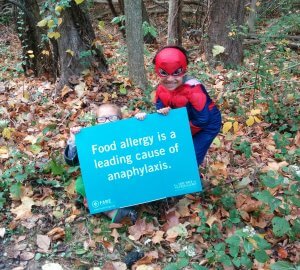Living with food allergies is like entering an alternate reality.
You continue to live right next to everyone else, yet your whole experience has changed. Most of those around you cannot completely understand the fears that occupy you daily. Fears that one wrong morsel could create a life-threatening reaction. It doesn’t end there. Navigating this alternative reality also requires convincing relatives, caretakers, teachers and other parents that this reality exists. Maneuvering awkward conversations with school staff, friends, and even strangers. The assertiveness you never knew you had must suddenly be awakened.
This comes with a major dose of anxiety. Sometimes that stress helps to mobilize you to keep your child safe. There are other times when that stress can be crippling. You feel overwhelmed by the responsibility and wish you could keep your child in a bubble. You worry how to talk to your child about this life threatening condition. Moreover, the strain of watching your child struggle to deal with safety, socializing and schooling is challenging.
What does anxiety look and feel like?
- Physical symptoms like heart racing, headaches, restlessness, stomach aches, diarrhea, nausea, fatigue, fidgeting, insomnia and sweating
- Thought symptoms like excessive worry, fear of threats and danger, apprehension of uncertainties, questioning and doubting one’s self, and perfectionism
- Avoidance to establish control of that which is feared and reduce the anxiety
Sound familiar? Ongoing fears of danger, avoidance of that which is feared, stomach aches, diarrhea, and nausea. Indeed, in many ways experiencing anxiety is synonymous with living with food allergies. As a food allergy parent, I’ve been to that place where the stress shifts from helpful to unnerving. Where your fears are so intense and feel so big that they might consume you. Children and teens can also become overwhelmed by having to deal with lunchtime at school, feeling different, going to parties, and explaining their condition to others. Not to mention, symptoms of anxiety can even mimic a reaction.
Panic Attacks/Disorder
Panic attacks are when the threat center of the brain starts sending out alarm signals to the rest of the body. This produces an overwhelming feeling of dread and doom that includes:
- Heart palpitations, chest pain, shortness of breath
- Stomach aches, nausea, diarrhea
- Skin tingling and numbing, sweating, and shaking
- Feelings of going crazy, losing control, that you might pass out and need to urgently escape.
Fears are heightened when apprehension and anxiety about having another panic attack infiltrate everyday life. Indeed, food allergies can create panic for an individual which makes managing food allergies more difficult.
Post Traumatic Stress Disorder
Also known as PTSD, this disorder can develop after having a life-threatening experience, witnessing a life-threatening experience or learning that a loved one has endured a life-threatening experience. Then, reacting to that experience with extreme horror, fear, and/or helplessness. Sound familiar? If your child has ever experienced anaphylaxis, the potentially fatal allergic reaction where multiple organ systems turn against the body, then you know exactly what I am talking about. The fear, the horror and the helplessness is excruciating and it stay with you.
Symptoms of PTSD include:
- Reliving the event
- Thinking about it over and over again. Intrusions upon the mind. Nightmares. Being triggered by a situation that causes you to re-experience the horror or even physical sensations of that day.
- Avoidance
- Avoiding situations that may cause you to reexperience the memory and dread of that day
- Example: Never letting your family leave your home to eat or your child developing a severe avoidance of food (even non-allergic ones)
- Negative thoughts and feelings
- Being overwhelmed by shame, guilt, horror, blame, anger or fear. Feeling estranged from others or losing interest in previously enjoyed activities.
- Example: Children feeling excessively different from others. Our job as parents is to protect. The guilt of a child experiencing a severe reaction can become unmanageable.
- Physically stressed out
- Can’t sleep or concentrate. Feeling hypervigilant, irritable and agitated.
Food phobias
Phobias are an irrational fear of something. When you have severe food allergies, there is nothing irrational about being afraid of food. Active vigilance is quite healthy, especially when going out to restaurants, at social events with food, and when trying a new food. However, there are times when fears of an allergic reaction can lead to avoiding foods that you or your child have no reason to believe they are allergic to. If enough of these foods are avoided, it can lead to weight loss, malnutrition and reduced quality of life. The fear of all food must be confronted and overcome.
All stress and anxiety is not bad
Stress helps to keep us alert to our safety and well-being. It can motivate us to learn and teach others as well as follow through on those things that keep us safe. Of course, stress must be manageable. Living with food allergies and experiencing a severe reaction can transform stress from helpful to overwhelming. By increasing your awareness of the physical and psychological signs of anxiety, you can take the necessary steps to calm the storm inside. In the next 3 portions of this series we will talk about how to help young children, teens, and parents manage that stress.
Check out the whole Food Allergies and Anxiety series:
Part 2: Helping Young Children
Part 3: Helping Teens
Part 4: 8 Tips to Become a Less Stressed Food Allergy Parent
Learn more about our Food Allergy Services
Contact us for a free phone consultation.
(908) 242-3634 or Connect Now
Next, helping young children manage food allergies → .
Brave Minds Psychological Services helps children, teens and families overcome severe anxiety, stress, and painful experiences. We specialize in developing brave minded youth that can move forward despite fears and significant challenges.





5 thoughts on “Food Allergies and Anxiety Series (Part 1 of 4): What does anxiety look like?”
Comments are closed.